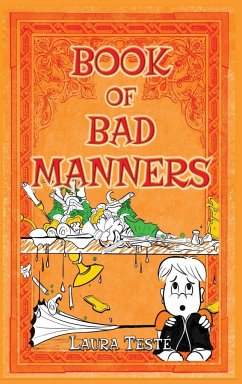
The Man with Bad Manners -- Der Mann mit den schlechten Manieren
Bilingual English-German Edition / Zweisprachige Ausgabe Englisch-Deutsch
Versandkostenfrei!
Versandfertig in 1-2 Wochen
14,99 €
inkl. MwSt.

PAYBACK Punkte
7 °P sammeln!
(Bilingual English-German edition / Zweisprachige Ausgabe Englisch-Deutsch) This is the story of a very badly behaved man, how a young boy in the village hatches a plan to change the man's behavior - and how, with the help of the other villagers, the plan succeeds, to everyone's benefit. Children, of course, love the idea of an adult behaving badly. At the same time, the story helps them learn valuable lessons about initiative, negotiation, conflict resolution and cooperation. Rose Mary Santiago's illustrations provide delightful and amusing counterpoint to the tale. The Man with Bad Manners i...
(Bilingual English-German edition / Zweisprachige Ausgabe Englisch-Deutsch) This is the story of a very badly behaved man, how a young boy in the village hatches a plan to change the man's behavior - and how, with the help of the other villagers, the plan succeeds, to everyone's benefit. Children, of course, love the idea of an adult behaving badly. At the same time, the story helps them learn valuable lessons about initiative, negotiation, conflict resolution and cooperation. Rose Mary Santiago's illustrations provide delightful and amusing counterpoint to the tale. The Man with Bad Manners is one of an illustrated series of Sufi teaching stories from the Middle East and Central Asia that were collected and adapted for children by Idries Shah, and that have captivated hearts and minds for more than a thousand years. The stories are designed to help children learn to examine their assumptions and to think for themselves. In the Sufi tradition, there is a continuum between the children's story, the entertainment or folklore story and the instructional or instrumental story. A story can help children deal with difficult situations and give them something to hold on to, but it can also stimulate a deeper understanding in adults. ¿Diese Geschichte erzählt von einem sehr schlecht erzogenen Mann, davon,wie ein kleiner Junge im Dorf einen Plan ausheckt, um das Verhalten des Mannes zu ändern - und wie der Plan mit Hilfe der anderen Dorfbewohner zum Vorteil aller gelingt. Kinder lieben natürlich die Vorstellung, dass sich ein Erwachsener schlecht benimmt. Gleichzeitig hilft ihnen die Geschichte, wertvolle Lektionen über Initiative, Verhandlung, Konfliktlösung und Zusammenarbeit zu lernen. Die Illustrationen von Rose Mary Santiago bilden einen reizvollen und amüsanten Kontrapunkt zur Geschichte. Der Mann mit den schlechten Manieren gehört zu einer illustrierten Reihe von Sufi-Lehrgeschichten aus dem Nahen Osten und Zentralasien, die von Idries Shah gesammelt und für Kinder adaptiert wurden und die Herzen und Köpfe seit mehr als tausend Jahren fesseln. Die Geschichten sollen Kindern helfen, ihre Annahmen zu überprüfen und selbstständig zu denken. In der Sufi-Tradition gibt es ein Kontinuum zwischen der Kindergeschichte, der Unterhaltungs- oder Folkloregeschichte und der Lehr- oder Instrumentalgeschichte. Eine Geschichte kann Kindern helfen, mit schwierigen Situationen umzugehen und etwas zum Festhalten geben, sie kann aber auch bei Erwachsenen zu einem tieferen Verständnis anregen.&n












